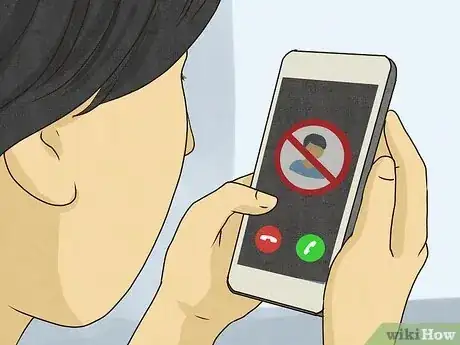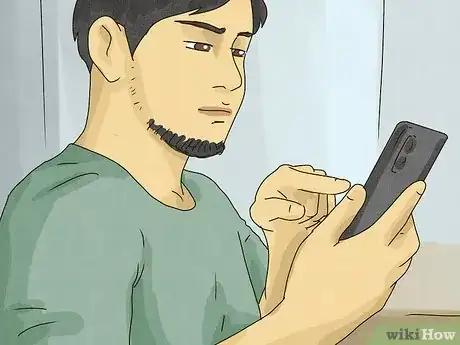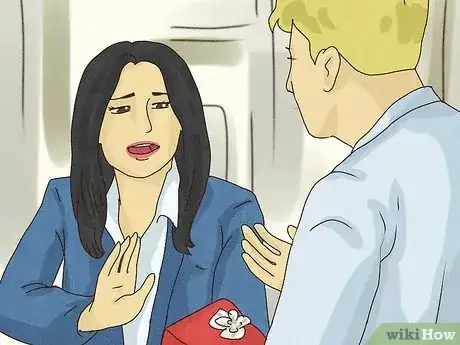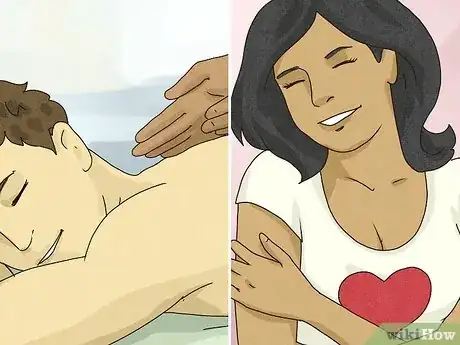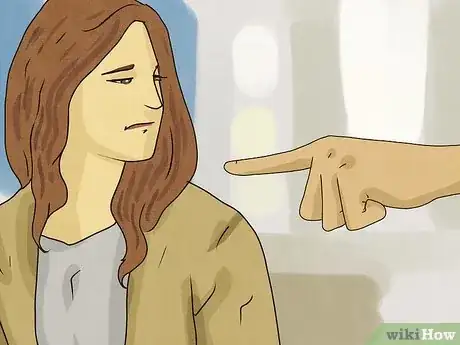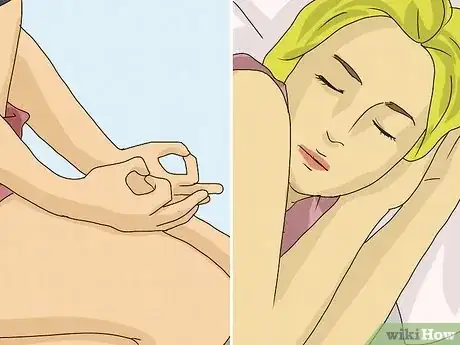This article was co-authored by Jay Reid, LPCC and by wikiHow staff writer, Danielle Blinka, MA, MPA. Jay Reid is a Licensed Professional Clinical Counselor (LPCC) in private practice in San Francisco, CA. He specializes in helping clients who have survived a narcissistic parent or partner. Treatment focuses upon helping clients identify and challenge self-diminishing beliefs as a result of narcissistic abuse. Jay holds a BA in Psychology from the University of Pennsylvania and an MS in Clinical Psychology from Penn State University.
wikiHow marks an article as reader-approved once it receives enough positive feedback. In this case, several readers have written to tell us that this article was helpful to them, earning it our reader-approved status.
This article has been viewed 224,477 times.
After a narcissist breaks your heart, you're left to pick up the pieces. You're probably feeling a mix of sadness, anger, and betrayal right now, and that's totally normal. When it comes to a narcissist, living your best life really is the best revenge. We’ll help you take control after a breakup with a narcissist so you can heal. Additionally, we’ll help you move on with your amazing life, while breaking the narcissist’s heart in the process.
Steps
Ignore their forms of manipulation.
-
Narcissists use their games to manipulate you, so don't let them. They have a whole slew of games they use to control you, such as love bombing, gaslighting, and revenge. You can’t beat a narcissist by playing their games because that’s what they want. Just ignore them when they try to manipulate you. This will drive them crazy because they can’t control you any more.[1] X Research source
- Don't argue with an narcissist because they'll just keep escalating things until they get their way. They're incapable of seeing things from your point of view. Just ignore them.[2] X Trustworthy Source HelpGuide Nonprofit organization dedicated to providing free, evidence-based mental health and wellness resources. Go to source
- Revenge is actually one of the narcissist’s games. When they feel slighted, they'll spread rumors about you, destroy your stuff, or get violent. In some cases, they'll pursue revenge over a long period of time.[3] X Research source
- Normal ways of getting revenge don’t work on a narcissist, but they’ll hate seeing you move on.
Flaunt how happy you are without them.
-
Seeing you happy absolutely tortures a narcissist. They will never truly be happy because they don’t have the emotional capacity for it. They can only play games and try to put others down.[4] X Research source Show them you’re living your best life without them, and they’ll experience their own version of heartbreak. You could:
- Post photos on social media of you having fun with friends or family.
- Brag to your mutual friends about your accomplishments or progress on goals.
- Go on a few casual or group dates to dip your toes in the dating scene.
- Give yourself a post-breakup makeover.
Set boundaries to protect yourself.
-
Boundaries help you shut down the narcissist, which they hate. Establish boundaries by figuring out what you need from this person. Then, tell them your expectations for them. Be honest about what you’re willing to accept from them, and what you won’t allow. You might say things like:
- “Please stop contacting me.”
- “Don’t share my photos with other people.”
- “I won’t talk to you when you’re yelling.”
- “I’m ending the conversation if you call me names.”
- “I’m only going to talk to you about the kids.”
Deny them what they want.
-
Focusing on your needs shows them what they’re losing. Narcissists are the biggest users ever. They expect you to be there for them, but they have no intention of reciprocating.[5] X Research source Start saying “no” to them, and focus on what you want instead. They’ll get super frustrated and realize how great a partner you were for them.
- Stop returning their phone calls and texts.
- Don’t react to anything they say or do.
- Refuse to give them compliments.
- Stop doing favors for them.
Stay calm when they try to upset you.
-
Narcissists need a reaction from you to be fulfilled, so don't give them one. They want you to get mad, distressed, or apologetic. Any type of reaction will make them feel like they’re winning, whether it’s lashing out, crying, or apologizing. Even though it’s hard, do your best to be calm and not react.[6] X Trustworthy Source Cleveland Clinic Educational website from one of the world's leading hospitals Go to source Try:[7] X Trustworthy Source American Psychological Association Leading scientific and professional organization of licensed psychologists Go to source
- Taking several deep breaths.
- Counting to 10.
- Repeating the word “relax” to yourself.
- Imagining a calm scene.
- Stretching.
Cut off all contact with them if you can.
-
Communicating with a narcissist gives them power, so take it away. They’ll try to use lines of communication to weasel their way back into your life. On the other hand, going no contact makes them feel your loss.[8] X Trustworthy Source HelpGuide Nonprofit organization dedicated to providing free, evidence-based mental health and wellness resources. Go to source Block them on your phone and social media, and try to avoid places they’ll be.
- You might have to keep talking to them if you have kids together or if you work with them. Try to keep your conversations limited to talking about your children or your job.
Be leery of future love bombing.
-
Avoid their attempts to suck you back in to keep control over your life. To do this, they’ll love bomb you like they did in the beginning of your relationship. They’re hoping to draw you back to them, which is called “hoovering.” However, this change is temporary, and they’ll be back to their narcissistic behavior again once you lower your defenses. Brush off their efforts and you’ll come out on top.
- They’ll likely shower you with compliments and tell you how much they miss you. They’re only going to keep this up until you come back, and then they’ll be back to their games.
Listen to your own inner voice.
-
Go after what you really want, without worrying about their opinion. When you’re with a narcissist, they try to undermine you and make you think you can’t trust yourself. They want you to feel like you’re less important than they are, but you’re just as competent and capable. Make the choices that feel right to you, and the narcissist will hate losing the control they had.
- You might go after the job you want, even though they said you wouldn’t be good at it. Similarly, you may decide to start a new hobby even though your ex said it would be a waste of time.
- Learn to follow your intuition.
Love yourself instead of loving them.
-
Use your energy to feed your own ego to prove that you're important. Instead of showering them with love, focus your efforts on meeting your own needs. Additionally, go after your hopes and dreams.[9] X Trustworthy Source HelpGuide Nonprofit organization dedicated to providing free, evidence-based mental health and wellness resources. Go to source Seeing you shine will drive a narcissist crazy and show them once and for all that they have no power over you. Now, that’s a heartbreak.
- Identify goals that are important to you.
- Practice self care so you look and feel your best.
- Compliment yourself.
Build a support system for yourself.
-
Rely on people who care about you as you recover. You deserve love and support, and there are people out there who truly value you. You might even make some new friends who don’t know the narcissist. That way, you’ll have people who are totally on your side.[10] X Trustworthy Source HelpGuide Nonprofit organization dedicated to providing free, evidence-based mental health and wellness resources. Go to source
- It’s possible that the narcissist will try to turn some people against you. This experience can be super painful, but it has nothing to do with you. Eventually, most people will recognize that the narcissist is the true problem. In the meantime, spend time with people who see your truth.
Place the blame on them.
-
Narcissists try to blame you for everything, but you’re not responsible. Nothing you could do justifies their toxic behavior. They choose to insult you, lie to you, and gaslight you so they can get power over you.[11] X Trustworthy Source Cleveland Clinic Educational website from one of the world's leading hospitals Go to source When you start to feel critical of yourself, remind yourself that you aren’t at fault. Additionally, talk to someone you trust who can offer you encouragement.
- Tell yourself things like, “I did everything I could to make our relationship wonderful,” “I can’t control anyone else’s actions,” “I gave 100% to my relationship.”
- Vent about your experiences to someone you can trust. Unfortunately, talking to the narcissist will only make them work harder to make you feel bad.
Focus on healing from the narcissist’s abuse.
-
Narcissists try to steal your power by criticizing you, so focus on self-empowerment. Their insults can damage your self-esteem, and they may have even made you doubt yourself. The truth is that you’re very worthy of love, and you have lots of wonderful and unique qualities that make you special. Take some time to remind yourself what makes you amazing.
- Consider working with a therapist to help you rebuild your self-esteem after this toxic relationship. They can help you heal from narcissistic abuse.
You Might Also Like

 Signs Your Ex Will Eventually Come Back
Signs Your Ex Will Eventually Come Back


 What Are the Bases in a Relationship? Defining the Baseball-Sex Metaphor
What Are the Bases in a Relationship? Defining the Baseball-Sex Metaphor
 The Top Emojis a Girl Will Use if She Likes You
The Top Emojis a Girl Will Use if She Likes You
 How to Tell if Your Girlfriend Is Horny: 12 Signs She's Turned On
How to Tell if Your Girlfriend Is Horny: 12 Signs She's Turned On
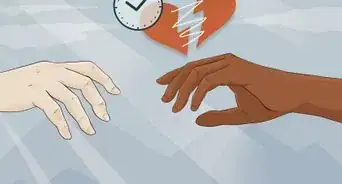 What to Do When Your Girlfriend Is Mad at You (10+ Steps to Take)
What to Do When Your Girlfriend Is Mad at You (10+ Steps to Take)
 12+ Texts to Send Your Girlfriend After a Fight: Apologies & More
12+ Texts to Send Your Girlfriend After a Fight: Apologies & More
 How to Have Phone Sex with Your Girlfriend
How to Have Phone Sex with Your Girlfriend

 33 Sweet & Romantic Apology Messages for Your Love
33 Sweet & Romantic Apology Messages for Your Love

 How to Respond when a Girl Says She Is Busy: 11 Ways to Reply
How to Respond when a Girl Says She Is Busy: 11 Ways to Reply
References
- ↑ https://www.psychologytoday.com/us/blog/toxic-relationships/201901/why-narcissists-play-games-your-heart
- ↑ https://www.helpguide.org/articles/mental-disorders/narcissistic-personality-disorder.htm
- ↑ https://psychcentral.com/blog/manipulation-games-narcissists-play#types-of-games
- ↑ https://psychcentral.com/blog/psychology-self/2017/11/narcissists-hate-happy#1
- ↑ https://www.psychologytoday.com/us/blog/toxic-relationships/201901/why-narcissists-play-games-your-heart
- ↑ https://health.clevelandclinic.org/how-to-heal-from-emotional-abuse/
- ↑ https://www.apa.org/topics/anger/control
- ↑ https://www.helpguide.org/articles/mental-disorders/narcissistic-personality-disorder.htm
- ↑ https://www.helpguide.org/articles/mental-disorders/narcissistic-personality-disorder.htm
About This Article




